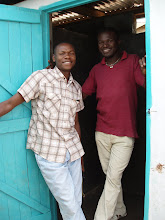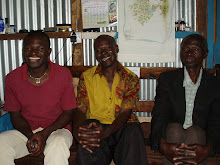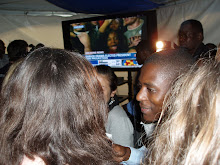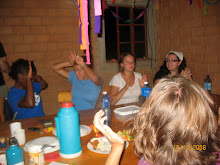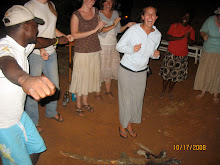I apologize! Nairobi life and Western obligations have kept me too busy to post. Since my last post I have written three papers, create two presentations, attended numerous meetings for my externship, started working out again, figured my schedule for next semester and started my internship search for spring semester as well. As my mother always said, "You have time to sleep in your grave child!" I guess I take after her! Even tonight I had booked a safari for my dad and I and I was trying to coordinate our flight time from Nairobi to Cairo to be only a few hours after we arrived back Nairobi after our safari so that we could squeeze in a 6 day Nile excursion before heading Israel. The woman at the travel agency wrote me, "You are going to live a hundred years!" I guess she is implying I could slow down...I told her I don't have a lower gear. It's almost 2 am but I wanted to leave you all with my last paper that was returned. It was a second Critical Incident that I had to reflect on. There is a contest with this one: Find the parody of the play and be the first to leave a comment with the correct answer I will write a blog post on anything you wish to know about Nairobi or my study abroad experience. Sawasawa!
Wouldn’t You Beat Your Wife?
A play of the conversation that momentarily shattered the view a newly arrived coworker had of her male colleagues. The tension of the topic burned under the hot Nairobi sun. The fiery exchange between different gendered, aged and cultured coworkers over a most uncomfortable subject was only intensified by the heat and pace of their walk through the dusty alleyways of Arebik. The gentlemen unreservedly honest in the delivery of their description of the behavior of the peers traumatized the extern. Immediately an introspective dialogue began to run in mind of the young girl to calculate the impact of her colleague’s words. As they rounded the corner to their office to continue with the day’s agenda the conversation ended without resolution.
Nairobi, Kenya
Playwright: Justine Raschio
Characters:
Girl
The Conscience of the Girl
Gentleman I
Gentleman II
Roommate I
Roommate II
ACT I: It can’t be so?
Three coworkers exit a fundraising meeting uneasy and hurry back to their office to gather equipment for the pageant practice for the upcoming community awareness event. The three are treading abreast through the streets debating among themselves over a controversial subject.
Girl’s conscience: The words in conversation that really matter are always in Kiswahili. I can never follow long enough to understand.
Girl: I wish I understood what you two were laughing about. I hope either I learn enough Kiswahili so I can eventually understand or you two gentlemen will translate the conversations for me.
Gentleman I: (smiling) We are laughing because we are teasing each other about beating our wives.
Girl’s conscience: No way. No wonder they didn’t speak in English!
Girl: Why would you beat your wife?
Gentleman II: I would beat her if she made a mistake in washing my clothing or in making my tea. I may even hurt her if she spent too much time outside the home with her friends.
Gentleman I: Hmm, ha ha, I would even beat her if she didn’t make the dinner I was hoping for.
Girl’s conscience: These two men are outstanding progressive members of Arebik. They beat their wives. Either The contradictory duality of their lives is astonishing or there is a colossal misunderstanding of their jocularity.
Girl: You two think your wives would be deserving of a beating for simple domestic oversights?
Gentlemen: (in chorus) Yes!
Girl’s conscience: I can’t believe this. I held these men in the highest regard of personal integrity and compassion. And they beat their wives over mistakes avoidable through clearer communication.
Girl: Have you considered washing your own clothing or making your own tea to avoid needing to ask your wife to do it differently? I understand that men and women traditionally stick closely to the roles engendered to be masculine or feminine here, but regular communication about household expectations between man and wife can help prevent more serious actions.
Gentleman I: I don’t consider beating my wife to be taking a serious action. It is out of concern for her that I would beat her. If she had not been able to understand how to perform her domestic duties through my words sometimes a beating would provide the necessary clarification.
Gentleman II: Beating our wives is an age old disciplinary practice created by our male ancestors to help us control our wives in the household. We do not beat them cruelly; we beat them to demonstrate how their domestic mistakes displease us. We beat them to show we love them and trust in their capacity to properly perform their household duties. They should worry when we stop beating them.
Girl’s conscience: To beat someone is to demonstrate violence not love. However, this contemporary widespread acceptance of physical discipline could be attributed to the legends young men have heard through oral storytelling. I have never heard an oral narrative, but having read plenty of African literature. I do know that domestic discipline is not rare at least in rural areas and may even be commonly accepted. Make sure to understand the whole situation before passing any judgment.
Girl: It is clear that the practice of beating wives is embedded in the hearts and minds of young men, but I do not agree that violence shows a woman her husband loves her. I think non-violent, verbal or non-verbal communication is always the key to resolving conflict, and if one line of communication fails…
Gentleman I: Then you must beat her…
Girl: No. Then another must be tried. If all lines of communication have failed then as a couple they must brainstorm together alternative forms of conflict resolution. It is totally barbaric to beat any human being, let alone your very own wife whom you love.
Gentlemen: Put yourself in our shoes. If she always made mistakes, wouldn’t you beat your wife?
Girl’s conscience: I can’t believe they would ask me to consider beating another human being, let alone a woman. For goodness sakes, I am a woman!
The coworkers are approaching the last corner before they reach the door to their shared office. The two gentlemen are laughing with the girl. Neither of the gentlemen is remotely concerned by the frown on her face. As the three enter the office the conversation is closed.
ACT II: Is it really so?
After work the girl rides a bus home wondering what her female roommates will think when she describes her lunchtime conversation with her coworkers. For the next two hours of her Kiswahili class the girl reflects on her contribution to the conversation to judge her reaction to her colleagues’ aggressive tradition, but without further consultation she would not be convinced of her appropriateness in that situation.
Roommate I: Hey you! How was work today?
Girl: It was one of the best so far, except for an alarming discussion I had with two of my coworkers about domestic abuse.
Roommate II: Domestic abuse? What did they say and what was your reaction?
Girl: (soberly) They told me how they would beat their wives for trivial mistakes in the house. They explained that they would beat them to teach them a lesson never to make the same mistake again. I felt as though they view their counterparts as children. It was very discouraging to hear what I considered to be gentlemen speaking so disrespectfully about their wives.
Roommates: (speechless) They would beat their wives?
Girl’s conscience: I am reassured that they reacted the same as I did when they heard what my coworkers had said. Is it because we are all American or is it because we are all women?
Girl: I guess. I was also surprised until I remembered that it has been a common household custom on this continent for generations. It seemed almost ironic to hear the gentlemen whom I consider to be avant-garde community members confess to upholding an outdated social custom of domestic abuse. I expressed my opposing opinion clearly and calmly but as the conversation closed neither viewpoint had surrendered and we were forced to agree to disagree on the matter of beating a woman.
Roommate I: Will you be able to continue work?
Girl: Of course. We are different people from different cultures with drastically different opinions of treatment of women. I realize our difference of opinion is rooted in cultural value systems and that our values have been enculturated in us since childhood and do not stand to be changed in a lunchtime dialogue. My work with my coworkers will only be affected if they discipline me for my mistakes the way they discipline their wives. Until that day, our differences will remain neutral in the office.
Epilogue: It isn’t so.
The following day the girl is in Arebik and she is walking back to the office with one of the gentleman. They stop at a small hotel to eat lunch before a pageant practice.
Gentleman II: Shall we eat chapati and maharagwe at this hotel?
Girl: Ndio. I was hoping to eat soon! Twende.
Gentleman II: I wanted to catch up with you since we haven’t had a chance to chat since you began working in Arebik.
The gentleman goes on to tell the girl his family history, his reasons for living in Arebik and his passion for community development. He also tells the girl about the woman he is hoping to marry.
Girl: I apologize if this offends you but I have to ask. Would you beat your girlfriend? I am asking only because I was confused yesterday whether you two gentlemen were speaking about yourselves when you spoke of beating your wives…
Gentleman II: (chuckling, and then in a most stern voice) I can only speak for myself but I would never beat a woman. I cannot speak for the other gentleman, but I can surely tell you that I would never harm another human, let alone a woman.
Girl’s conscience: I feel relieved. I had obviously misinterpreted their stories yesterday.
Girl: (reassured) Thank you. I needed clarification. I misinterpreted yesterday’s conversation.
Gentleman II: It is no problem; we were just testing your feeling on the subject. Should we be going?
Girl’s conscience: He had finally translated the situation so that I could understand the full conversation. I realized that we are simply young professionals who have been given a perfect opportunity to bounce cross cultural thoughts between each other. Our conversation was a learning moment that forced me to reconsider comments and events before jumping to conclusions about seemingly bizarre cross cultural practices. I will have to remember this I the future.
Girl: Ah hah, I finally understand. The laughing and provocative questions yesterday were a test! Don’t tell me whether I passed! (laughing) Let’s go.
Thursday, November 13, 2008
Wednesday, November 5, 2008
Kujikwa si kuanguka, bali ni kwende mbele - To stumble is not to fall down, but is to go forward
This morning at 7:00 am I watched Barack Obama deliver his speech at Grant Park on CNN at the U.S. Ambassador's Residence. I have to say standing there amidst over 1,000 people who were black, white, American, Dutch, Kenyan, rich, poor, student or MP in the Kenyan Parliament, I was emotional. I have to say that the atmosphere was overwhelmingly pro-Obama and it was altogether a once-in-a-lifetime experience! If I had to be in any foreign country during this election I would pick Kenya! His father's village of Kogelo held a mock election and His Excellency Kibaki (the President of Kenya) declared a public holiday for tomorrow Nov. 6! Leo ni leo asemayo kesho mwongo - Today is today, he who says tomorrow is a liar. Today was a historic day for the United States, but who knows what tomorrow will bring. As Mayah has told me today, "Obama has made a lot of promises, he better get going!" If anything the people of United States earned themselves about 40 million new friends right here in Kenya! Pictures have to come later, they aren't uploading at the moment.
Complete Text of Remarks by President-Elect Barack Obama, Nov. 4, 2008, Chicago, Ill.
If there is anyone out there who still doubts that America is a place where all things are possible; who still wonders if the dream of our founders is alive in our time; who still questions the power of our democracy, tonight is your answer.
It’s the answer told by lines that stretched around schools and churches in numbers this nation has never seen; by people who waited three hours and four hours, many for the very first time in their lives, because they believed that this time must be different; that their voice could be that difference.
It’s the answer spoken by young and old, rich and poor, Democrat and Republican, black, white, Latino, Asian, Native American, gay, straight, disabled and not disabled –- Americans who sent a message to the world that we have never been a collection of red states and blue states: we are, and always will be, the United States of America.
It’s the answer that led those who have been told for so long by so many to be cynical, and fearful, and doubtful of what we can achieve to put their hands on the arc of history and bend it once more toward the hope of a better day.
It’s been a long time coming, but tonight, because of what we did on this day, in this election, at this defining moment, change has come to America.
I just received a very gracious call from Sen. McCain. [UPDATE: Complete text of Sen. John McCain's concession speech available here.] He fought long and hard in this campaign, and he’s fought even longer and harder for the country he loves. He has endured sacrifices for America that most of us cannot begin to imagine, and we are better off for the service rendered by this brave and selfless leader. I congratulate him and Gov. Palin for all they have achieved, and I look forward to working with them to renew this nation’s promise in the months ahead.
I want to thank my partner in this journey, a man who campaigned from his heart and spoke....
...for the men and women he grew up with on the streets of Scranton and rode with on that train home to Delaware, the vice president-elect of the United States, Joe Biden.
I would not be standing here tonight without the unyielding support of my best friend for the last sixteen years, the rock of our family and the love of my life, our nation’s next First Lady, Michelle Obama. Sasha and Malia, I love you both so much, and you have earned the new puppy that’s coming with us to the White House. And while she’s no longer with us, I know my grandmother is watching, along with the family that made me who I am. I miss them tonight, and know that my debt to them is beyond measure.
To my campaign manager David Plouffe, my chief strategist David Axelrod, and the best campaign team ever assembled in the history of politics – you made this happen, and I am forever grateful for what you’ve sacrificed to get it done.
But above all, I will never forget who this victory truly belongs to -– it belongs to you.
I was never the likeliest candidate for this office. We didn’t start with much money or many endorsements. Our campaign was not hatched in the halls of Washington –- it began in the backyards of Des Moines and the living rooms of Concord and the front porches of Charleston.
It was built by working men and women who dug into what little savings they had to give five dollars and ten dollars and twenty dollars to this cause. It grew strength from the young people who rejected the myth of their generation’s apathy; who left their homes and their families for jobs that offered little pay and less sleep; from the not-so-young people who braved the bitter cold and scorching heat to knock on the doors of perfect strangers; from the millions of Americans who volunteered, and organized, and proved that more than two centuries later, a government of the people, by the people and for the people has not perished from this Earth. This is your victory.
I know you didn’t do this just to win an election and I know you didn’t do it for me. You did it because you understand the enormity of the task that lies ahead. For even as we celebrate tonight, we know the challenges that tomorrow will bring are the greatest of our lifetime -– two wars, a planet in peril, the worst financial crisis in a century.
Even as we stand here tonight, we know there are brave Americans waking up in the deserts of Iraq and the mountains of Afghanistan to risk their lives for us. There are mothers and fathers who will lie awake after their children fall asleep and wonder how they’ll make the mortgage, or pay their doctor’s bills, or save enough for college. There is new energy to harness and new jobs to be created; new schools to build and threats to meet and alliances to repair.
The road ahead will be long. Our climb will be steep. We may not get there in one year or even one term, but America –- I have never been more hopeful than I am tonight that we will get there. I promise you –- we as a people will get there.
There will be setbacks and false starts. There are many who won’t agree with every decision or policy I make as president, and we know that government can’t solve every problem. But I will always be honest with you about the challenges we face.
I will listen to you, especially when we disagree. And above all, I will ask you join in the work of remaking this nation the only way it’s been done in America for 221 years –- block by block, brick by brick, calloused hand by calloused hand.
What began twenty-one months ago in the depths of winter must not end on this autumn night. This victory alone is not the change we seek -– it is only the chance for us to make that change. And that cannot happen if we go back to the way things were. It cannot happen without you.
So let us summon a new spirit of patriotism; of service and responsibility where each of us resolves to pitch in and work harder and look after not only ourselves, but each other. Let us remember that if this financial crisis taught us anything, it’s that we cannot have a thriving Wall Street while Main Street suffers -– in this country, we rise or fall as one nation; as one people.
Let us resist the temptation to fall back on the same partisanship and pettiness and immaturity that has poisoned our politics for so long. Let us remember that it was a man from this state who first carried the banner of the Republican Party to the White House –- a party founded on the values of self-reliance, individual liberty, and national unity.
Those are values we all share, and while the Democratic Party has won a great victory tonight, we do so with a measure of humility and determination to heal the divides that have held back our progress. As Lincoln said to a nation far more divided than ours, “We are not enemies, but friends…though passion may have strained it must not break our bonds of affection.” And to those Americans whose support I have yet to earn -– I may not have won your vote, but I hear your voices, I need your help, and I will be your president too.
And to all those watching tonight from beyond our shores, from parliaments and palaces to those who are huddled around radios in the forgotten corners of our world –- our stories are singular, but our destiny is shared, and a new dawn of American leadership is at hand. To those who would tear this world down –- we will defeat you.
To those who seek peace and security -– we support you. And to all those who have wondered if America’s beacon still burns as bright –- tonight we proved once more that the true strength of our nation comes not from our the might of our arms or the scale of our wealth, but from the enduring power of our ideals: democracy, liberty, opportunity, and unyielding hope.
For that is the true genius of America -– that America can change. Our union can be perfected. And what we have already achieved gives us hope for what we can and must achieve tomorrow.
This election had many firsts and many stories that will be told for generations. But one that’s on my mind tonight is about a woman who cast her ballot in Atlanta. She’s a lot like the millions of others who stood in line to make their voice heard in this election except for one thing –- Ann Nixon Cooper is 106 years old.
She was born just a generation past slavery; a time when there were no cars on the road or planes in the sky; when someone like her couldn’t vote for two reasons –- because she was a woman and because of the color of her skin.
And tonight, I think about all that she’s seen throughout her century in America –- the heartache and the hope; the struggle and the progress; the times we were told that we can’t, and the people who pressed on with that American creed: Yes, we can.
At a time when women’s voices were silenced and their hopes dismissed, she lived to see them stand up and speak out and reach for the ballot. Yes, we can.
When there was despair in the Dust Bowl and depression across the land, she saw a nation conquer fear itself with a New Deal, new jobs and a new sense of common purpose. Yes, we can.
When the bombs fell on our harbor and tyranny threatened the world, she was there to witness a generation rise to greatness and a democracy was saved. Yes, we can.
She was there for the buses in Montgomery, the hoses in Birmingham, a bridge in Selma, and a preacher from Atlanta who told a people that “We Shall Overcome.” Yes, we can.
A man touched down on the moon, a wall came down in Berlin, a world was connected by our own science and imagination. And this year, in this election, she touched her finger to a screen, and cast her vote, because after 106 years in America, through the best of times and the darkest of hours, she knows how America can change. Yes, we can.
America, we have come so far. We have seen so much. But there is so much more to do. So tonight, let us ask ourselves –- if our children should live to see the next century; if my daughters should be so lucky to live as long as Ann Nixon Cooper, what change will they see? What progress will we have made?
This is our chance to answer that call. This is our moment. This is our time –- to put our people back to work and open doors of opportunity for our kids; to restore prosperity and promote the cause of peace; to reclaim the American Dream and reaffirm that fundamental truth –- that out of many, we are one; that while we breathe, we hope, and where we are met with cynicism, and doubt, and those who tell us that we can’t, we will respond with that timeless creed that sums up the spirit of a people:
Yes, we can. Thank you, God bless you, and may God bless the United States of America.
Source: http://latimesblogs.latimes.com/washington/2008/11/barack-obama.html
Complete Text of Remarks by President-Elect Barack Obama, Nov. 4, 2008, Chicago, Ill.
If there is anyone out there who still doubts that America is a place where all things are possible; who still wonders if the dream of our founders is alive in our time; who still questions the power of our democracy, tonight is your answer.
It’s the answer told by lines that stretched around schools and churches in numbers this nation has never seen; by people who waited three hours and four hours, many for the very first time in their lives, because they believed that this time must be different; that their voice could be that difference.
It’s the answer spoken by young and old, rich and poor, Democrat and Republican, black, white, Latino, Asian, Native American, gay, straight, disabled and not disabled –- Americans who sent a message to the world that we have never been a collection of red states and blue states: we are, and always will be, the United States of America.
It’s the answer that led those who have been told for so long by so many to be cynical, and fearful, and doubtful of what we can achieve to put their hands on the arc of history and bend it once more toward the hope of a better day.
It’s been a long time coming, but tonight, because of what we did on this day, in this election, at this defining moment, change has come to America.
I just received a very gracious call from Sen. McCain. [UPDATE: Complete text of Sen. John McCain's concession speech available here.] He fought long and hard in this campaign, and he’s fought even longer and harder for the country he loves. He has endured sacrifices for America that most of us cannot begin to imagine, and we are better off for the service rendered by this brave and selfless leader. I congratulate him and Gov. Palin for all they have achieved, and I look forward to working with them to renew this nation’s promise in the months ahead.
I want to thank my partner in this journey, a man who campaigned from his heart and spoke....
...for the men and women he grew up with on the streets of Scranton and rode with on that train home to Delaware, the vice president-elect of the United States, Joe Biden.
I would not be standing here tonight without the unyielding support of my best friend for the last sixteen years, the rock of our family and the love of my life, our nation’s next First Lady, Michelle Obama. Sasha and Malia, I love you both so much, and you have earned the new puppy that’s coming with us to the White House. And while she’s no longer with us, I know my grandmother is watching, along with the family that made me who I am. I miss them tonight, and know that my debt to them is beyond measure.
To my campaign manager David Plouffe, my chief strategist David Axelrod, and the best campaign team ever assembled in the history of politics – you made this happen, and I am forever grateful for what you’ve sacrificed to get it done.
But above all, I will never forget who this victory truly belongs to -– it belongs to you.
I was never the likeliest candidate for this office. We didn’t start with much money or many endorsements. Our campaign was not hatched in the halls of Washington –- it began in the backyards of Des Moines and the living rooms of Concord and the front porches of Charleston.
It was built by working men and women who dug into what little savings they had to give five dollars and ten dollars and twenty dollars to this cause. It grew strength from the young people who rejected the myth of their generation’s apathy; who left their homes and their families for jobs that offered little pay and less sleep; from the not-so-young people who braved the bitter cold and scorching heat to knock on the doors of perfect strangers; from the millions of Americans who volunteered, and organized, and proved that more than two centuries later, a government of the people, by the people and for the people has not perished from this Earth. This is your victory.
I know you didn’t do this just to win an election and I know you didn’t do it for me. You did it because you understand the enormity of the task that lies ahead. For even as we celebrate tonight, we know the challenges that tomorrow will bring are the greatest of our lifetime -– two wars, a planet in peril, the worst financial crisis in a century.
Even as we stand here tonight, we know there are brave Americans waking up in the deserts of Iraq and the mountains of Afghanistan to risk their lives for us. There are mothers and fathers who will lie awake after their children fall asleep and wonder how they’ll make the mortgage, or pay their doctor’s bills, or save enough for college. There is new energy to harness and new jobs to be created; new schools to build and threats to meet and alliances to repair.
The road ahead will be long. Our climb will be steep. We may not get there in one year or even one term, but America –- I have never been more hopeful than I am tonight that we will get there. I promise you –- we as a people will get there.
There will be setbacks and false starts. There are many who won’t agree with every decision or policy I make as president, and we know that government can’t solve every problem. But I will always be honest with you about the challenges we face.
I will listen to you, especially when we disagree. And above all, I will ask you join in the work of remaking this nation the only way it’s been done in America for 221 years –- block by block, brick by brick, calloused hand by calloused hand.
What began twenty-one months ago in the depths of winter must not end on this autumn night. This victory alone is not the change we seek -– it is only the chance for us to make that change. And that cannot happen if we go back to the way things were. It cannot happen without you.
So let us summon a new spirit of patriotism; of service and responsibility where each of us resolves to pitch in and work harder and look after not only ourselves, but each other. Let us remember that if this financial crisis taught us anything, it’s that we cannot have a thriving Wall Street while Main Street suffers -– in this country, we rise or fall as one nation; as one people.
Let us resist the temptation to fall back on the same partisanship and pettiness and immaturity that has poisoned our politics for so long. Let us remember that it was a man from this state who first carried the banner of the Republican Party to the White House –- a party founded on the values of self-reliance, individual liberty, and national unity.
Those are values we all share, and while the Democratic Party has won a great victory tonight, we do so with a measure of humility and determination to heal the divides that have held back our progress. As Lincoln said to a nation far more divided than ours, “We are not enemies, but friends…though passion may have strained it must not break our bonds of affection.” And to those Americans whose support I have yet to earn -– I may not have won your vote, but I hear your voices, I need your help, and I will be your president too.
And to all those watching tonight from beyond our shores, from parliaments and palaces to those who are huddled around radios in the forgotten corners of our world –- our stories are singular, but our destiny is shared, and a new dawn of American leadership is at hand. To those who would tear this world down –- we will defeat you.
To those who seek peace and security -– we support you. And to all those who have wondered if America’s beacon still burns as bright –- tonight we proved once more that the true strength of our nation comes not from our the might of our arms or the scale of our wealth, but from the enduring power of our ideals: democracy, liberty, opportunity, and unyielding hope.
For that is the true genius of America -– that America can change. Our union can be perfected. And what we have already achieved gives us hope for what we can and must achieve tomorrow.
This election had many firsts and many stories that will be told for generations. But one that’s on my mind tonight is about a woman who cast her ballot in Atlanta. She’s a lot like the millions of others who stood in line to make their voice heard in this election except for one thing –- Ann Nixon Cooper is 106 years old.
She was born just a generation past slavery; a time when there were no cars on the road or planes in the sky; when someone like her couldn’t vote for two reasons –- because she was a woman and because of the color of her skin.
And tonight, I think about all that she’s seen throughout her century in America –- the heartache and the hope; the struggle and the progress; the times we were told that we can’t, and the people who pressed on with that American creed: Yes, we can.
At a time when women’s voices were silenced and their hopes dismissed, she lived to see them stand up and speak out and reach for the ballot. Yes, we can.
When there was despair in the Dust Bowl and depression across the land, she saw a nation conquer fear itself with a New Deal, new jobs and a new sense of common purpose. Yes, we can.
When the bombs fell on our harbor and tyranny threatened the world, she was there to witness a generation rise to greatness and a democracy was saved. Yes, we can.
She was there for the buses in Montgomery, the hoses in Birmingham, a bridge in Selma, and a preacher from Atlanta who told a people that “We Shall Overcome.” Yes, we can.
A man touched down on the moon, a wall came down in Berlin, a world was connected by our own science and imagination. And this year, in this election, she touched her finger to a screen, and cast her vote, because after 106 years in America, through the best of times and the darkest of hours, she knows how America can change. Yes, we can.
America, we have come so far. We have seen so much. But there is so much more to do. So tonight, let us ask ourselves –- if our children should live to see the next century; if my daughters should be so lucky to live as long as Ann Nixon Cooper, what change will they see? What progress will we have made?
This is our chance to answer that call. This is our moment. This is our time –- to put our people back to work and open doors of opportunity for our kids; to restore prosperity and promote the cause of peace; to reclaim the American Dream and reaffirm that fundamental truth –- that out of many, we are one; that while we breathe, we hope, and where we are met with cynicism, and doubt, and those who tell us that we can’t, we will respond with that timeless creed that sums up the spirit of a people:
Yes, we can. Thank you, God bless you, and may God bless the United States of America.
Source: http://latimesblogs.latimes.com/washington/2008/11/barack-obama.html
Subscribe to:
Posts (Atom)
